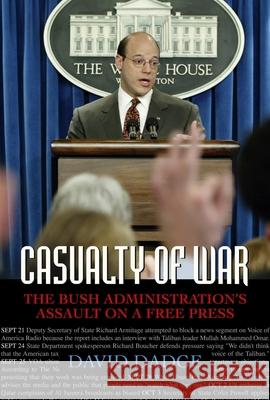Casualty of War: The Bush Administration's Assault on a Free Press » książka
Casualty of War: The Bush Administration's Assault on a Free Press
ISBN-13: 9781591021476 / Angielski / Twarda / 2004 / 349 str.
In an era of terrorism national security has understandably moved to the forefront of public concern. But with this new emphasis on safety, the press--both here and abroad--has begun to feel the repressive hand of government attempting to limit its role of uncovering and publishing newsworthy information. In its global campaign to fight terrorism is the Bush administration trying to muzzle freedom of speech?
David Dadge, editor at the International Press Institute, documents a number of disturbing incidents of attempted press censorship in this interesting perspective on the rising tensions between powerful government interests and independent journalists. Among the alarming developments after September 11, Dadge highlights the Bush administration's hasty attempts to impose constraints on the reporting of the Voice of America and on Al-Jazeera, its creation of the short-lived Office of Strategic Influence, and its public criticism of journalists who appeared to be out of step with the general patriotic fervor. Fears that the long-cherished right of free expression would be sacrificed were further exacerbated when media executives from major broadcasting networks started censoring output. At the same time, journalists who failed to articulate the prevailing view were vilified or, in some cases, removed from their jobs. In this climate, many other journalists have felt the need to affirm their patriotism (or else).
In some ways even more disturbing, Dadge describes the effects that such actions have had on the governments of other countries. Following the lead of the current U.S. administration, several governments elsewhere have sought to justify repressive measures by pointing to the example of America, the self-professed world champion of freedom. The danger exists, as Dadge clearly shows, that the War on Terror will become a cloak for justifying all sorts of abuses.
Dadge concludes by arguing that rather than suppressing the media, political and military institutions would be better off in the end by actually increasing existing freedoms. This carefully researched and well-argued discussion of free expression under siege should be of great interest and concern to all who care about one of our most important liberties.











